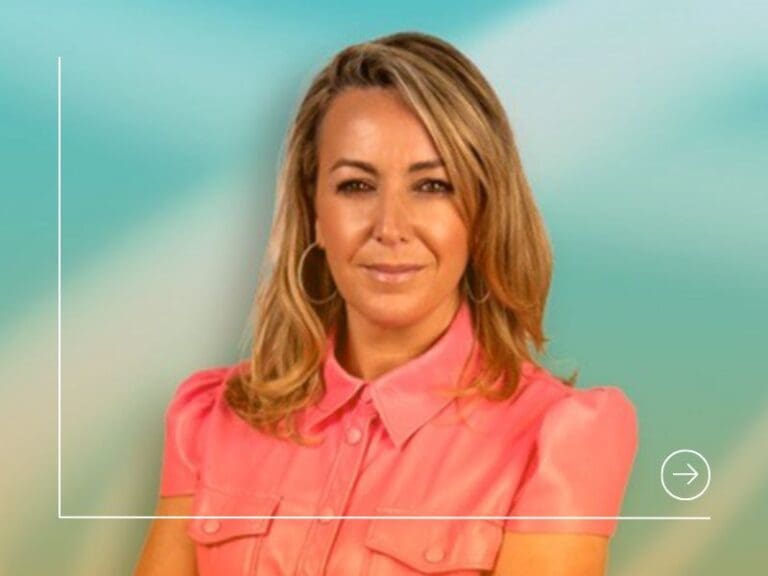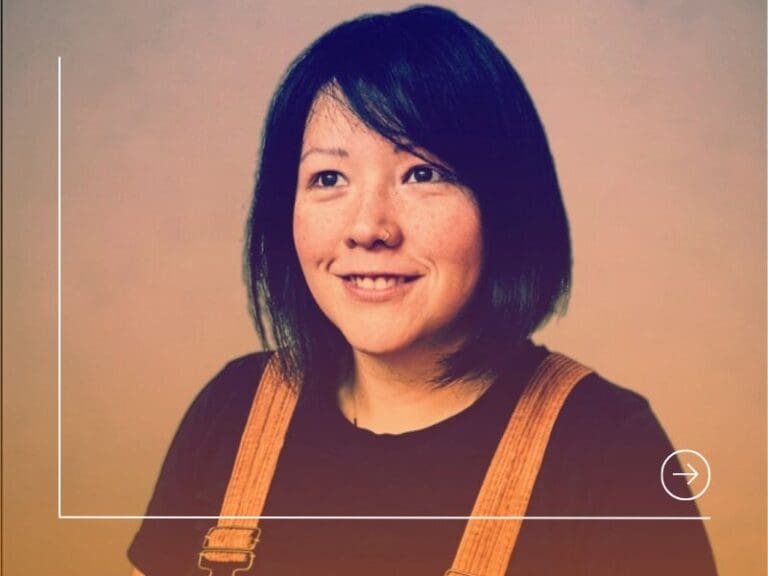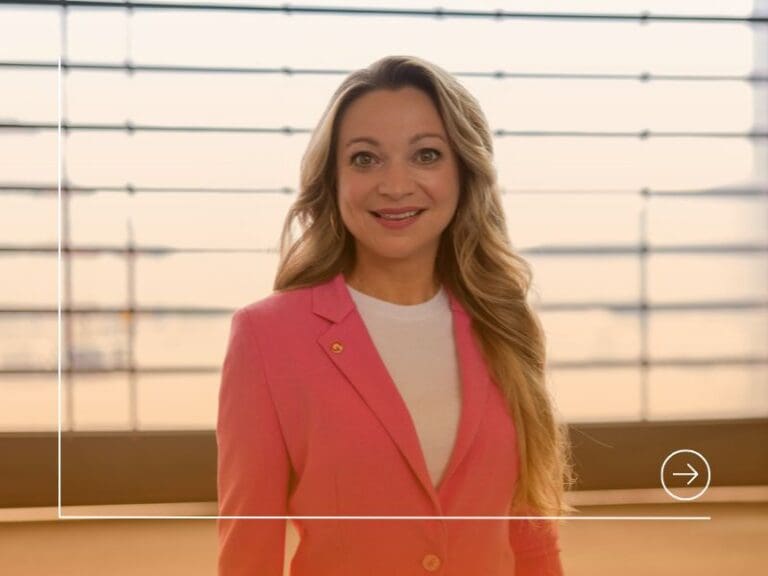Laura has worked in several companies in the financial industry, where she led digital product development and drove agile projects.
She is a strong believer in customer-centric and easy-to-use products and prides herself on being very hands-on throughout the whole development process.
SHECANCODE CAUGHT UP WITH LAURA TO TALK ABOUT ENTERING THE WORLD OF WORK, WHAT AN AVERAGE DAY LOOKS LIKE FOR HER, AND HER CAREER ADVICE.
HOW DID YOU LAND YOUR CURRENT ROLE? WAS IT PLANNED?
Completely by accident actually! After my graduation from university, I joined a real estate company, where I worked as a Broker Assistant, they noticed my natural curiosity and understanding of technical things and later promoted me to Marketing and Product Manager, responsible for the development of web databases and marketing channels. After five years with this team, I wanted something new.
My husband was invited to the AAZZUR boot camp retreat in Vienna by Philipp Buschmann and Martin Damaske, the founders of FinTech start-up AAZZUR, and I came along as a plus one!
The boot camp lasted 3 months, everyone was living together developing the company and building the AAZZUR platform and I naturally became involved in their process, first as an intern to help with research, marketing, design and all the other small things in the new company. After AAZZUR was selected for a TechStars accelerator program I was offered the position of Product Manager, this lasted four years before I was promoted to Head of Product.
WHAT ARE THE KEY ROLES IN YOUR FIELD OF WORK, AND WHY DID YOU CHOOSE YOUR CURRENT EXPERTISE?
It’s important to mention that team dynamic and structure strongly depends on the size of the company and business structure. You can’t compare team structures in 500+ employees corporates and 10 people start-ups. Nevertheless, the key roles in the product team would be one Product Manager, one Tech Lead/ Architect, one Designer, three-six Developers, and one or two QAs (Quality Assurance).
The main responsibility of a Product Manager is to provide the vision and requirements to the team. To collect requirements and information from stakeholders, analyse and evaluate users’ feedback, create a roadmap of features, and prioritize them. A good person for this role is someone who not only can see the big picture or get the grand idea but also has the ability to split it into small tangible steps and make the right priority order. It’s also very important to communicate well with all the involved parties, not only to listen and understand what is being said but also to read between the lines.
The Tech Lead/Architect’s job is to plan the development of required features. They are responsible for selecting the partners/tools/providers that are needed to develop the functionality. They are also responsible for informing the team about technical limitations or dependencies on the other parts. Here you want a very strong technical person, someone senior with experience in the field, who can design and technically deliver the setup and evaluate all the moving parts. It is a big bonus if this person can communicate well not only with the team, but also with partners and clients.
The Designer is responsible for creating the user journey and experience, based on requirements provided by the product manager and restrictions based on technical limitations. Here you need a customer-centric UI/UX expert, for me, it’s not about how nice designs look but also about how functional they are.
The main task for Developers is to build the product and deliver the technology. Usually, you pick your Developers based on their experience, knowledge in the field, and their own preference for projects. I think a good development team is a mixture of more senior and junior Developers.
QA makes sure all the requirements and design solutions are actually made and the product can go to end-users. The person here must be creative; it’s not only about following the main path (expected user journey) but also venturing to backroads and off-roads.
The most important part of the team, independent of the structure and roles, is that all the members must work together like a well-oiled machine. The team needs to discuss and communicate with each other to find the best solutions and deliver the best product. Everyone must be flexible, open to different ideas, and make compromises.
DID YOU (OR DO YOU) HAVE A ROLE MODEL IN TECH OR BUSINESS IN GENERAL?
I’m not a big believer in role models. I think everyone must live their life the best they can and make their own plans, goals, and achievements. Concentrating on becoming the best version of themselves with their current situation, opportunities, and capabilities.
If you constantly measure yourself by some idol or role model it can be more harmful than useful. Don’t get me wrong, it’s ok to be inspired by someone’s success, results, way of thinking etc, but it should still be just an inspiration. Your role model might have a successful business and one child by the time they are 26 years old, and by 35 they may have sold the business added two more children, and a dog, and then started a new company! You on the other hand, at age 28 years old could still be working as an employee in the company and can’t keep your plants alive. I think this leads to depression, not success.
Everyone has a different life, with different circumstances, networks, capabilities, and shortcomings and there is no common way to reach success. I think it’s better to concentrate on analysing your own situation and how to reach your goals within your capabilities, than measuring yourself against the polished versions of someone’s life.
So, I choose not to have role models.
WHAT ARE YOU MOST PROUD OF IN YOUR CAREER, SO FAR?
I’m always proud of my team. In various ventures that I was involved with, I was always proud of the people and the team that I’m working with. I think I’m a good judge of people’s characters and make different people work in the team. This also makes me proud of everything we can accomplish together.
I’m also proud of myself, the courage I have, and the growth I have experienced. I started my career with no prior education or experience in this field. I was thrown into it because at the time, in my team, I was the one who most likely would not drown because of how quickly I can learn to swim. Even now, with almost 10 years in the field, I’m still learning something new every day. I think I should also be proud of my innate learning capabilities.
I also learned to be proud and happy about all small things. In my personal experience, the grand releases and the delivery of the projects are not as satisfying as they might look like from the outside. The bigger they are the more likely they are not going to go as planned.
WHAT DOES AN AVERAGE WORKDAY LOOK LIKE FOR YOU?
There is no such thing as an average workday in my line of work. I don’t have a set time to start my workday, due to the different geographies and time zones of the people I work with, sometimes I start early in the morning, and sometimes I have a late start due to late-night meetings.
Usually, I start my day by checking all the emails and prioritizing them, I try to keep it around 30 min. I follow the rule if a reply takes less than three minutes to reply, I do it now, if it’s longer I’ll keep it for later.
The only stable meeting on my day is a daily team meeting, where we discuss accomplishments from the last day and things we will focus on today and all of the issues and blockers we are facing. After that anything can happen. If my team has a blocker or some kind of urgent issue, I’ll do my best to solve it ASAP.
I would say usually 40%-60% of my day is booked in various meetings with clients, partners, workshops, and internal meetings. I try to keep at least 10-20% of my day for creative work, unfortunately, a lot of this allocated time is spent on email replies. The rest of my time is mainly small miscellaneous tasks, answering extra questions from the team, or just simply trying a new product release.
HAS ANYONE EVER TRIED TO STOP YOU FROM LEARNING AND DEVELOPING IN YOUR PROFESSIONAL LIFE, OR HAVE YOU FOUND THE TECH SECTOR SUPPORTIVE?
A lot of information is available online, so no one can stop you from learning or getting a better understanding of basic concepts, methodologies, practices, tools etc. Also, in my personal experience, Developers are very friendly and helpful, sometimes they tend to use specific language, but then I just ask them to translate it into common English.
I’m also very grateful to my husband, who had a lot of patience in giving me a crash course on all the things technical. He is 100% responsible for my shift from a more marketing role to a product role, I kept asking questions and he kept providing me with answers and at the point where I needed more specific knowledge, he referred me to some courses.
I’m also thankful to the AAZZUR founding team (Philipp, Martin and Richard), who let me grow a lot, they invested a lot of their time and some company recourses to help me grow and learn new skills and try myself in various situations and positions.
I understand that sometimes it might be difficult to learn and grow if you don’t have support and backing from your team, supervisors, or family or if no one is willing to spend time with you answering questions and giving you guidelines. In this case, I would suggest changing your environment, there are many communities (online and live) where you can get all the support you want, it is just about picking the right one for you.
HAVE YOU EVER FACED INSECURITIES AND ANXIETIES DURING YOUR CAREER, AND HOW DID YOU OVERCOME THEM?
Every time we onboard a new customer or start a new project, I feel a bit anxious. If it’s a new client I usually don’t know the other team, their dynamics, or their preferred communication/ work style, who is making decisions, and how long it will take. I think the best approach in this situation is to start with an open mind and don’t have some expectations or prejudice about how things should be or go. Prepare the milestones and have a vision but don’t plan/anticipate every move and step.
If it’s a new project, usually it’s a new and unexplored business. Don’t be afraid to say that you don’t know something or if it’s your first time going deeper into this topic. It’s ok to not know some things, all of us have our stronger sides and our field of expertise. I found experts on the topic tend to talk in abbreviations or jargon only, understandable for people who are already well familiar with the topic (I do this too). If you say early on that this is something new for you, they try to avoid jargon or explain the meaning. If at the beginning you establish your level of expertise, I found it is also easier to stop someone and ask questions.
ENTERING THE WORLD OF WORK CAN BE DAUNTING. DO YOU HAVE ANY WORDS OF ADVICE FOR ANYONE FEELING OVERWHELMED?
A person should be prepared to get a lot of information in a very short time and have a plan on how to systemize it in the way that works best for them. From your previous experiences or even years in school and university, you know what’s the best way for you to learn and absorb new information so you should use the same method for work too. You should come prepared to learn and have a plan for how you’ll do it. Also, be open about it, if the best way for you to remember the information is that someone is showing or explaining it to you, inform your onboarding team or superior about it and I’m sure they’ll accommodate you.
No one expects you to know everything, so don’t be afraid to ask questions, but don’t ask the same questions repeatedly. I think everyone likes initiative people, who not only care about the task they must do but about the bigger picture too, why it’s done and how it affects others. This applies to the interview process too.
WHAT ADVICE WOULD YOU GIVE OTHER WOMEN WANTING TO REACH THEIR CAREER GOALS IN TECHNOLOGY?
It’s not as difficult a field as it might look. Everything can be learned, and no one was born knowing all. I think the key ingredient is to show that you are committed, motivated, and eager to learn. Also, make realistic goals, it’s always good to have a dream, but goals must be realistic and achievable in a time frame. It also gives a boost of confidence if you reach your goal and new energy to go to the next one.
I think it’s also important to have a good life and work balance. You can’t be concentrated only on reaching your professional goals by working 70 or 80 hours a week. A good life and work balance recharges you and gives you a fresh perspective on problems. I think for success and happiness it’s necessary to separate your work and life. Yes, it’s more than possible to reach success and set up goals in the shorter term with you only concentrating on work, but this doesn’t bring happiness. I hear from multiple people who worked long hours ignoring their personal life and accomplished their goals, reached the top, but then they are burned out and what’s worse – there is no one to celebrate with.








